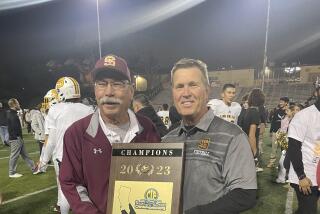SIMI VALLEY : Youths Help Bring Japan, U.S. Together
- Share via
The miniature Japanese flag stood next to the Stars and Stripes on the lectern in the Simi Covenant Church.
In the church hall, 17 Japanese youths age 13 to 16 were singing songs, putting up decorations and practicing a sumo wrestling demonstration in preparation for a sayonara party where they would say goodby to the east Ventura County families that have hosted them for the last week.
The timing of their visit--on the 50th anniversary of the end of World War II hostilities between the United States and Japan--is entirely appropriate, said Rocky A. Mori, executive director of the Japan-America Educational Exchange Program, which organized the trip.
“The tragic thing about that war was that the American people didn’t know anything about the Japanese people, and the Japanese people didn’t know anything about the American people,” Mori said. “Had we had such [an exchange] 50 years ago, there was no way that such a regrettable war would have taken place.”
References to the war cropped up occasionally during the trip. Niki Yoshida, 15, was saddened when the grandfather in her Simi Valley host family told of his son, killed fighting Japan in World War II.
For most of the time, however, the youths dealt with far less weighty topics. They toured Disneyland and Universal Studios, the Ronald Reagan Presidential Library and the Simi Valley City Hall and police station. Some went to a Dodgers game, others went swimming in back-yard pools. They all practiced their English.
It was so much fun that Kotaro Ohkawa, 14, said he was not sure he wanted to go back to Japan.
“In America, people are friendly. Even strangers say hi,” he said through an interpreter.
Ryan Jeffers, 13, whose Moorpark family is hosting Kotaro, said he was having a great time and even learning some Japanese.
Ryan said the host-exchange student relationship has not been without its glitches, like the time Kotaro went for a morning run, got lost and did not return for two hours. Other exchange students complained that they miss the rice and soy sauce that are staples of their diet in Japan.
Still, most of the youths agreed with Niki, who pronounced the United States “very nice.”
More to Read
Sign up for Essential California
The most important California stories and recommendations in your inbox every morning.
You may occasionally receive promotional content from the Los Angeles Times.












